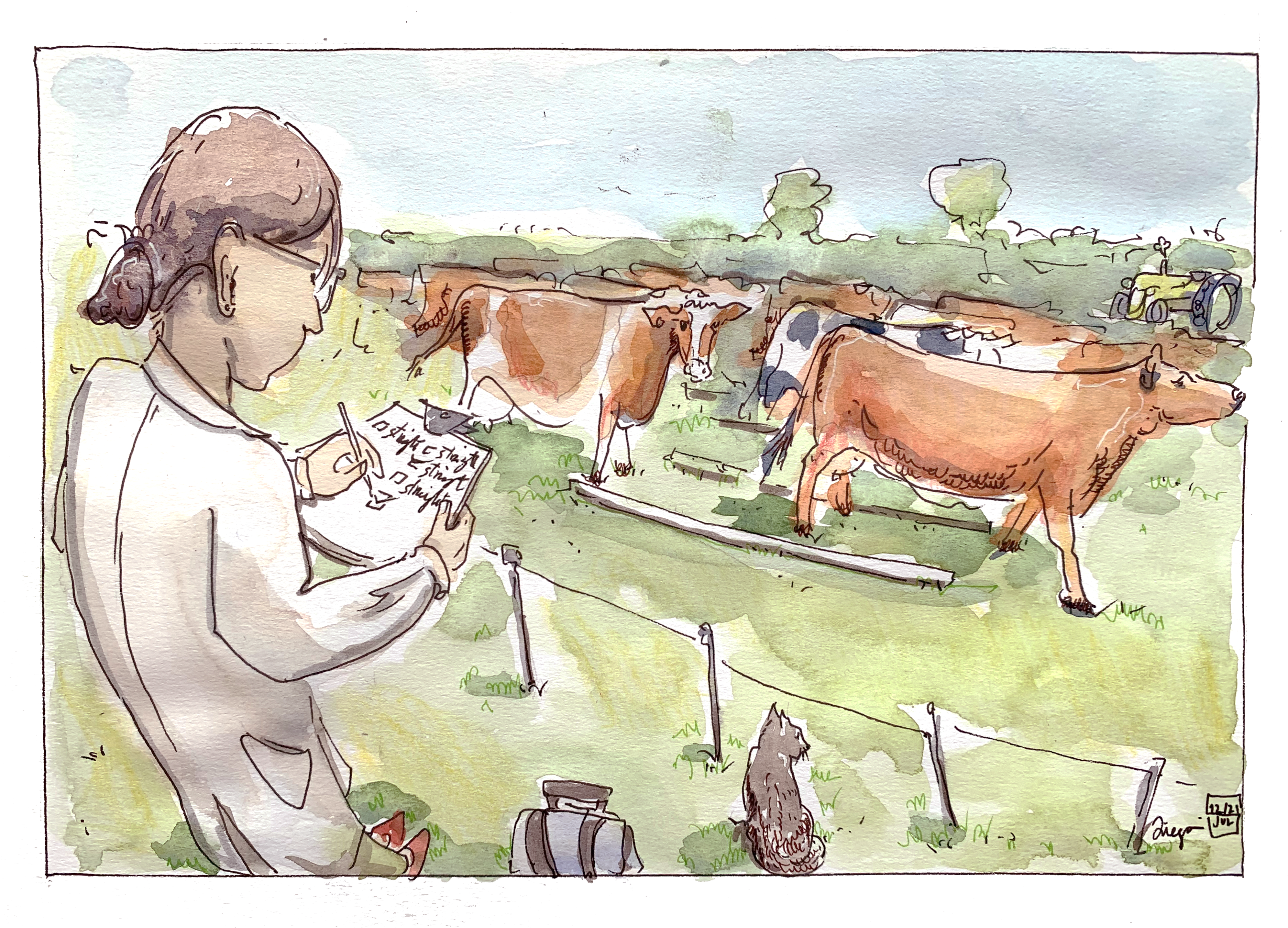Media Images
PLOS’ Media Team commissions infographics and illustrations for selected PLOS papers, which are shared with journalists alongside other press materials and sometimes feature in media coverage of the research. These beautiful images are licensed under CC-BY, and they are curated here for the interest and use of readers. The related research paper may be accessed from the link in each image credit.

Illustration by Diego Perez-Lopez, PLOS, CC-BY 4.0
They’re sober, honest! Scientists made dairy cows walk in a straight line – but to test their gait, not their alcohol intake! Link to associated research paper (Tijssen et al., 2021).
AI experts suggest 39 percent of domestic chores could be automated within a decade

Infographic by Anne-Lise Paris, (www.in-graphidi.com), PLOS, CC-BY 4.0
Researchers predicted the percentage of time that will no longer be spent on housework in 5 years and in 10 years, thanks to automation of domestic tasks. The predictions estimated by experts varied according to their country and gender (top panel). Experts’ estimation of the reduction in time dedicated to domestic work also varied significantly between activities (bottom panel): grocery shopping was predicted to be most automatable within 10 years whereas physical childcare was predicted to be least automatable.
Link to associated research paper (Shi et al., 2023).
Seven canine behaviors seen as important for bonding with your dog

Illustration by Diego Perez-Lopez, PLOS, CC-BY 4.0
Owners identify seven behaviors which they report as important for bonding with their dog: physical touch, consistency, proximity, communication, positivity, attunement, and shared activities. Link to associated research paper (Riddoch et al., 2022).

Illustration by Diego Perez-Lopez, PLOS, CC-BY 4.0
Bumblebees can learn to solve a puzzle by watching a trained “demonstrator” bee
Bumblebees can learn by watching a trained bee demonstrating one of two ways to solve puzzle for a sugary reward, then copy the bee to solve the puzzle in the same way. Link to associated research paper (Bridges et al., 2023).
Dogs with more active owners may get more exercise

Illustration by Diego Perez-Lopez, PLOS, CC-BY 4.0
Compared to inactive owners, active dog owners report exercising their dogs more and report their dogs’ weight as healthier. Link to associated research paper (Banton et al., 2022).
Great Britain’s city centers ranked on “greenness”

Infographic by Anne-Lise Paris, (www.in-graphidi.com), PLOS, CC-BY 4.0
Researchers used a new greenness metric to rank the UK’s 68 urban centers with a population of over 100,000, with the top five being Exeter, Islington, Bristol, Bournemouth, and Cambridge, and the bottom five being Glasgow, Middlesbrough, Sheffield, Liverpool, and Leeds. Link to associated research paper (Robinson et al., 2022).

Illustration by Diego Perez-Lopez, PLOS, CC-BY 4.0
Sniffer dogs can detect great crested newts
In experiments, a trained English springer spaniel accurately detected critically endangered Great Crested newts, at a distance and even underground. Link to associated research paper (Glover et al., 2023).
Dogs’ average age at cancer diagnosis is associated with size, sex, breed

Infographic by Anne-Lise Paris, (www.in-graphidi.com), PLOS, CC-BY 4.0
Researchers studied the median age at which 43 different dog breeds are diagnosed with cancer, finding that Mastiffs had the youngest median age at cancer diagnosis (5 years), while Bichon Frises had the oldest median age (11.5 years). The median age of cancer diagnosis was also seen to be lower for purebred dogs than for mixed breed dogs. This information may guide cancer screening practices for earlier detection and treatment. Link to associated research paper (Rafalko et al., 2023).
The Secret Life of Bees: Honey bee behavior within the hive

Illustration by Diego Perez-Lopez, PLOS, CC-BY 4.0
Through video analysis, the researchers identified multiple honey bee behaviours inside the hive, including hive remodelling, surface cleaning, self-grooming, brood care, pollen and nectar storage, and even cannibalism. Link to associated research paper (Siefert et al., 2021).